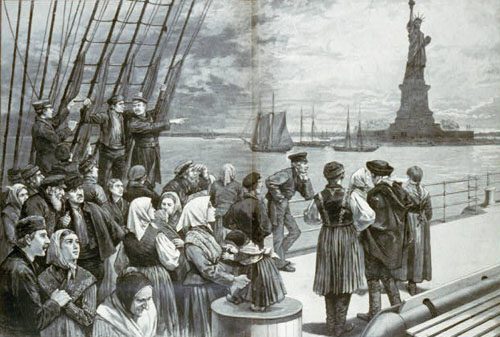100 Years Ago Today, from Issues & Controversies in History:
IMMIGRATION ACT OF 1921: Government Sets First Quotas Restricting European Immigration
Was the Immigration Act of 1921 necessary, or unfair? Be sure to check out Issues & Controversies in History’s complete and unbiased coverage of this issue. Learn more about the issue and check out a sample of the pro/con arguments on both sides below.
Try Issues & Controversies in History today!
THE ISSUE
In 1921, Congress passed a law limiting European immigration, particularly from southern and eastern Europe. Was the Immigration Act of 1921 necessary to protect the U.S. from a flood of “undesirable” immigrants? Or was it an unfair law that would hurt American businesses by depriving them of labor?
| Arguments in favor of the immigration act: | Arguments against the immigration act: |
| As many as 15 million Europeans are waiting to flood U.S. shores; they will overburden U.S. resources and take away jobs from Americans. Furthermore, most of those immigrants are southeastern European, and are inferior to the northern Europeans who previously constituted the majority of immigrants to the U.S. The southeastern European immigrants are mainly criminals and prostitutes, and will contribute to social problems in the U.S. | There is no flood of immigrants waiting to travel to the U.S. And even if there were, limitations in transportation would keep them from arriving in the U.S. in dangerous numbers. Furthermore, keeping out immigrants will only hurt the farms and businesses that depended on the immigrants for labor. The U.S. is a vast nation, and there is room for everyone. As a nation of immigrants, it would be unfair and unjust to deny other people the opportunities life in the U.S. offered. |
Issues & Controversies in History links this pro/con article to rich related resources that enhance the debate. Students and researchers can delve into primary sources that provide context, a topic-specific timeline, a bibliography, and more. Plus, discussion questions are provided to inspire critical thinking and analysis.
What Is Issues & Controversies in History?
Issues & Controversies in History places students at the center of the great debates and conflicts in U.S. and world history, exploring the issues as the key players saw them or, in some cases, as historians have interpreted them. This comprehensive reference database delivers dynamic, concise, and balanced coverage of a broad range of topics, from slavery, empire, and revolution to race, gender, economy, and disease, all over the globe. By building a deeper understanding of how historical events and conflicts have influenced U.S. and world history over the past 5,000 years, Issues & Controversies in History is a powerful tool for helping researchers analyze primary sources, answer document-based questions, and prepare for history debates and research projects.
Click on the links below for more information about Issues & Controversies in History and to take a free trial:



